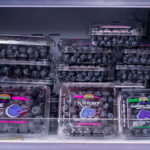Kids critical for tropical fruit sales in U.S.

Tropical fruit consumption has increased in the U.S. since the Covid-19 pandemic. In general, consumers seem to be purchasing healthier products that offer nutritious value to their family's diets.
“Customers are getting more adventurous with the things they are trying, and I attribute that to fruit like kiwi, or mango which used to be very exotic, and with them becoming more mainstream, it pushes the envelope for more exotic fruits to come into the mainstream,” Christopher Colombo, officer of Goldenberry Farms tells FreshFruitPortal.com.
Goldenberry farms, grower, packer, exporter, and merchandiser of tropical fruit is constantly looking at consumer trends, and recent studies show that nearly 94% of children ask for a purchase from a parent while shopping at grocery stores, and inside the supermarket is where parents are the most open to influence from their kids.
In general, children seem to have significant influence on product decisions for which they will be the primary consumer.
Companies like Goldenberry Farms use these cues to help create products and packaging more likely to be purchased in a store, knowing that impulsive buyers will focus on family-friendly and kid-friendly “extra” purchases.
In 2020, the Miami-based company created its “Ramboo” fruit-loving characters, an educational concept that now headlines a series of fruit-finding tropical adventures, featuring rambutan as the exotic “prize.”
“Rambutan is very rich in Vitamin C, which is a very potent antioxidant,” says Palumbo.
The “Ramboos'' character-branded product line offers an introduction to the world of tropical fruit. Colorful labels feature seasonal scenes, complemented by in-store merchandising and interactive games, available free of charge.
Most recently, Goldenberry has introduced its “Ramboos Big Adventure” game on the App Store and Google Play, as a value-add to the product line.
Since launching, “Ramboos” has been available at a growing number of major retailers, and feedback shows that this “themed” product significantly outsells its generically labeled counterpart.
“We usually see a bump of about 18 to 22% in consumption when a store switches from a generic product to a Goldenberry branded one. Our labels allow the customer to see the product better, learn how to eat it and what health benefits they have,” adds Palumbo.
Rambutan features a brilliant red, “soft and spiky” exterior, giving it a very exotic and almost animated quality.
Rambutan is hand-harvested, non-GMO, and available in 12-ounce packs made with plant-friendly materials and recycling in mind. Bulk sizes are also available for food service clients.
Goldenberry Farm’s rambutans are sourced from Guatemala and Honduras, from July until mid-January.
Tropical fruits are available in retailers all around the country.
Goldenberry Farm’s specialty
Golden berries are the company's star product, and it is one of the healthiest fruits in the market, according to the OREC value which measures the level of antioxidants in different products.
“Golden berries have three times the amount of antioxidants as green tea, and it also has zinc and Vitamin C, which means it provides a lot of health benefits,” says Palumbo.
He adds that retail demand is rising for golden berries, leading the firm to open new suppliers for the U.S. market.
“We expect to be a leading provider of that fruit, it's our specialty fruit and we do a lot of research on it so we know how to sell it, working with retailers to incorporate them into their berry program and maximize sales,” notes Palumbo.
Golden berries are coming into season now, and with their qualities, Palumbo assures that “with the fall and winter coming up, it's perfect to take when the weather is changing and you need something to boost your immune system.”
Golden berries are grown and shipped to the U.S. from Colombia and Ecuador, which have the required altitude and climates.
















































